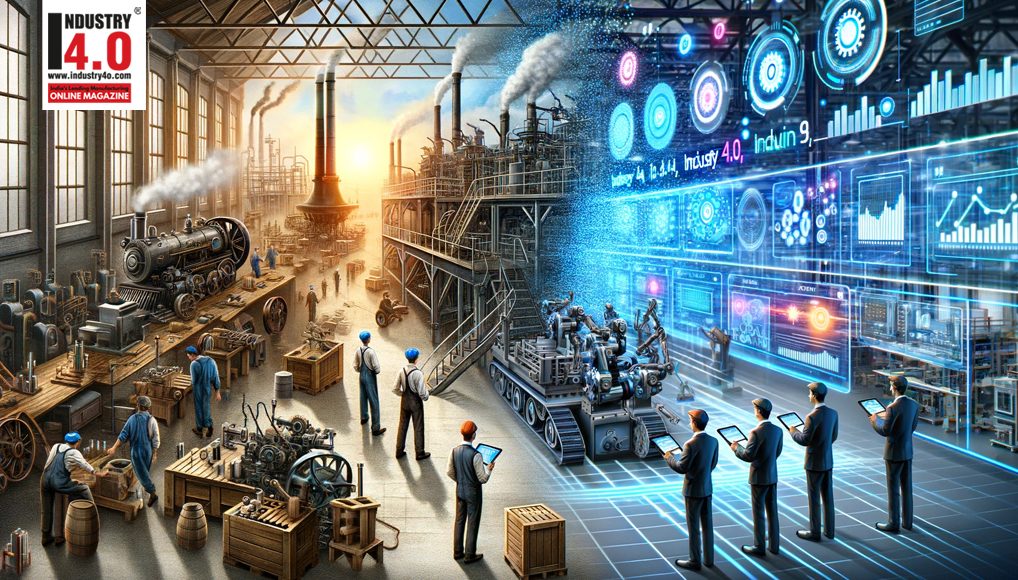Unlocking IT System Reliability: Industry 4.0 ‘s Impact on Manufacturing Excellence
In the era of digital transformation, Industry 4.0 has emerged as a revolutionary force in manufacturing, reshaping how companies operate, improve, and distribute their products. At the core of this transformation lies the integration of digital technologies into manufacturing processes, giving birth to a new era of efficiency, productivity, and innovation. While the benefits of Industry 4.0 are undeniable, they come hand in hand with new challenges, especially in the realm of IT system reliability. In this article, we will explore how manufacturing can harness the power of Industry 4.0 to drive IT system reliability and ensure a seamless transition into the future of production.
The Essence of Industry 4.0
Industry 4.0, often referred to as the fourth industrial revolution, represents a paradigm shift in manufacturing. It is characterized by the creation of digital twins, virtual replicas of processes, production lines, factories, and supply chains. These digital twins are brought to life by the vast troves of data collected from IoT sensors, devices, PLCs, and other interconnected objects. The result is a manufacturing ecosystem where machines, systems, and humans collaborate harmoniously in real-time, unlocking unprecedented levels of efficiency and productivity.
While Industry 4.0 promises a brighter future for manufacturing, it also presents new risks and challenges, with one of the most pressing being IT system reliability. As companies embrace digital transformation, they must ensure that their IT systems are robust, resilient, and capable of supporting the demands of a connected manufacturing environment.
Investing in IT System Reliability
To thrive in the Industry 4.0 landscape, manufacturers must invest in two critical components: skills and infrastructure. These investments are pivotal in achieving IT system reliability and ensuring a seamless transition to the digital era.
- Skills and Expertise
A significant challenge faced by many manufacturing companies is the shortage of skilled professionals who can navigate the complexities of Industry 4.0. According to surveys, a considerable portion of companies lack the necessary talent to implement digital transformation effectively. To bridge this gap, investing in training and development programs is essential.
Training existing employees and hiring new talent with expertise in IoT, data analytics, cybersecurity, and automation can empower manufacturers to build and maintain reliable IT systems. These professionals can play a crucial role in identifying vulnerabilities, implementing cybersecurity measures, and optimizing digital processes to enhance system reliability.
- IT Infrastructure
A robust IT infrastructure forms the backbone of Industry 4.0. Companies must evaluate their existing systems and make necessary upgrades to support the digital transformation effectively. While some organizations may already have appropriate IT infrastructure in place, others may need to invest significantly in this area.
Distributed computing and control are essential components of Industry 4.0, allowing data from various sources to be aggregated and analyzed for better decision-making. Implementing reliable and scalable computing systems is critical to achieving this goal. Moreover, authenticated and secure communication channels are necessary to safeguard sensitive data and prevent cyber threats.

Leveraging Industry 4.0 for IT System Reliability
Now that we understand the importance of skills and infrastructure, let’s delve into how Industry 4.0 can be harnessed to enhance IT system reliability in manufacturing.
- Reliability-Centered Maintenance
One of the primary ways Industry 4.0 improves IT system reliability is through data analytics. By leveraging data from connected devices, manufacturers can implement reliability-centered maintenance, including predictive maintenance. Predictive maintenance uses machine learning algorithms to analyze data and predict when equipment is likely to fail. This proactive approach reduces downtime, extends the lifespan of machinery, and ultimately enhances IT system reliability.
- Reliability Engineering Methodologies
Reliability engineering is a cornerstone of Industry 4.0. It involves the application of engineering reliability methodologies to measure efficiency and productivity accurately. In an environment where data is king, reliability engineering helps identify significant factors and conditions affecting device performance. This method is essential for ensuring that electronic devices and products are safe and reliable.
- Robust Connections
Industry 4.0 thrives on robust connections. Smart factories can respond instantly to changing workloads, delivering products of greater variety and complexity at lower costs. Reliable connections between machines, sensors, and control systems are critical to achieving this level of responsiveness. Companies must invest in robust networking infrastructure to ensure data flows smoothly and without interruptions.
- Adaptation to Market
In an ever-evolving market landscape, adaptability is key to survival. Industry 4.0 enables manufacturers to gather real-time data on market trends, customer preferences, and supply chain dynamics. This information empowers companies to adapt swiftly to market changes, reducing the risk of financial losses and business failure.
Projected Market Growth for Industry 4.0 in IT System Reliability
The growth potential of Industry 4.0 in enhancing IT system reliability is staggering. Market projections indicate a bright future for companies embracing this transformation.
According to research, the global Industry 4.0 market is set to skyrocket from $130.90 billion in 2022 to an impressive $377.30 billion by 2029, with a compound annual growth rate (CAGR) of 16.3% during the forecast period. Another study predicts even more remarkable growth, with the Industry 4.0 market expected to reach $579.44 billion by 2030, growing at a CAGR of 19.87% from 2023 to 2030.
These projections underscore the increasing adoption of Industry 4.0 technologies, such as predictive maintenance, distributed computing and control, and pervasive sensing, which are driving market growth. Additionally, the implementation of reliability engineering methodologies in Industry 4.0 is poised to contribute significantly to this expansion.
Conclusion
Industry 4.0 is a transformative force that is reshaping the manufacturing landscape. While it offers immense opportunities for increased efficiency and productivity, it also presents new challenges, especially in the realm of IT system reliability. To thrive in the digital era, manufacturing companies must invest in skills, infrastructure, and the latest technological advancements.
By embracing Industry 4.0, manufacturers can leverage data analytics, reliability engineering, robust connections, and market adaptability to enhance IT system reliability. The projected market growth for Industry 4.0 in IT system reliability reflects its increasing significance in the manufacturing sector. As the industry continues to evolve, those who harness the power of Industry 4.0 will be best positioned to thrive in the digital age of manufacturing.
About the Author:

Mr. Deep Manishkumar Dave
Specialist Industrial IoT Engineer | Technology Consultant
LTIMindtree Limited,
![]()
Raynham, Massachusetts, United States.
Mr. Deep Dave is an accomplished Specialist Industrial IoT Engineer and a distinguished member of the Intelligent Automation Congress (IAC) and the Institution of Engineering and Technology
Mr. Deep Dave extensive experience and expertise make him a valuable asset to any discussion in the field. Furthermore, his recognition as a LinkedIn Community Top Voice in multiple crucial domains, such as Artificial Intelligence, Information Technology, Cloud Computing, Digital Transformation, Healthcare Management, and Blockchain, underscores his unwavering dedication to remaining at the forefront of emerging technologies.
With an impressive track record spanning over five years as a Specialist Industrial IoT Engineer at LTIMindtree Limited, Mr. Deep Dave have been instrumental in driving digital transformation and Industrial Internet of Things (IIoT) initiatives across both the manufacturing and healthcare sectors.
Mr. Deep Dave ability to provide valuable insights to authors and contribute significantly to the review process is a testament to his expertise.
Mr. Deep Dave academic background includes a B.Tech in Mechatronics Engineering and an M.Sc. in Engineering Management. These qualifications, combined with hands-on experience in deploying advanced technologies such as Artificial Intelligence (AI), Machine Learning (ML), automation, sensors, and analytics platforms, have enriched his foundational knowledge.
Mr. Deep Dave unwavering commitment to continuous learning and staying updated on the latest industry trends is evident in his dedication to ongoing reading, research, and scholarly contributions.
As a dedicated member of the IEEE and with Mr. Deep Dave extensive experience in the healthcare and medical device life science sector, he possess a profound understanding of the intricate relationship between digital transformation and industrial automation. My expertise lies in crafting comprehensive digital strategies that optimize business processes, leading to exceptional outcomes in this dynamic sector.
Mr. Deep Dave is bestowed with following Licenses & Certifications :
https://www.linkedin.com/in/de
Mr. Deep Dave can be contacted at :
E-mail | LinkedIn | Web












